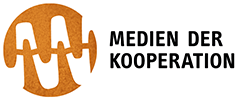For a detailed program, please see: https://www.mediacoop.uni-siegen.de/jahrestagung-2017/
The second annual conference of the Collaborative Research Centre “Media of Cooperation” brings together researchers interested in studying the manifold realizations of cooperative practices from a variety of scholarly backgrounds. We understand cooperation in broad terms as any form of mutual making, in which goals, means, and procedures are seen as ongoing accomplishments. From the exchanges of goods or information, to the interactions between bodies or organizations, and the coordination between colleagues, competitors, friends or foes. Mutually making the conditions of mutual making entails translating heterogeneous interests, negotiating conflicting values and articulating distributed activities. On the one hand, the individual papers and sessions of the conference will cover different notions and concepts of cooperation in diverse fields of study: from the mundane cooperation of everyday life to collective endeavors within specific domains. On the other hand, the contributions share a focus on the practices of making cooperation possible through cooperatively creating the conditions for cooperation itself. Seeing cooperative media both as a condition and consequence of cooperation, the conference will shed light on a general feature of media, technologies and instruments that both enable and constrain the collaboration between heterogeneous social worlds, with and without consensus.
In order to connect the broad variety of cooperations in the empirical projects that share the analytic focus on cooperatively creating the conditions of cooperation, the conference aims to map the diversity of cooperative practices along three analytic dimensions: scaling, composing and monitoring. These dimensions do not fix cooperation as a neatly defined unit, but allow for the empirical and conceptual comparisons of diverse and messy, sometimes consensual and sometimes conflicting, occurings of cooperation.
- SCALING. Cooperation varies depending on its size and duration. Some forms of cooperation occur in short sequences, in physical co‐presence and with no more than two entities involved. Others span decades, are performed on a global scale by states and large organizations. Of course, many forms of larger‐scale cooperation depend on forms of smaller‐scale cooperation – and the other way around. We are interested in which ways such different scales of cooperations require and produce different media of cooperation.
- COMPOSING. The second dimension touches on the first. Cooperation also varies according to the entities it is composed of and their relations. There are elementary forms of cooperation that lie at the base of every social interaction. They occur whenever two entities come in contact with each other and commence in some form of mutual adjustment. Other forms of cooperation may be strategically planned, involving many heterogeneous entities that need to be aligned along a specific cooperative purpose. Again, naturally occurring cooperation and purposefully created cooperation often run side by side, but we suspect they also differ in the cooperative media being created and used.
- MONITORING. Cooperation necessarily includes multiple ways of mutual monitoring. The cooperative activities may be open and transparent, but they may also be incidental, unnoticed or clandestine. This extends to the question in how far participating in cooperation is deliberate, unwitting or unwanted. If cooperative media support forms of cooperation that lack shared goals and allow for cooperation without consensus, this requires us to ask questions about control, domination and power inscribed in media as a consequence and condition of cooperation.
The seven panels of the conference will open up the diversity of cooperation emphasizing one of two interrelated perspectives: areas and ways of cooperation.
The areas of cooperation span from academia to enterprises and social media platforms:
- being lost in cooperation in digitally networked media/social media,
- engaging with cooperative research data management in the e‐humanities,
- understanding cooperation in enterprises from a historical point of view,
- reflecting cooperation in academia.
The ways of cooperation highlight different modes of mutually making:
- considering ways of Doing Da Sein / doing being there as cooperative accomplishment,
- rethinking repositories in cooperation in media studies, as well as
- addressing the relations of bodies and the materiality of cooperation.
We will discuss large and small scale cooperation, in different compositions and varying patterns of monitoring cooperation, incidental and volatile as well as planned and durable cooperation in its historical and contemporary forms and how they all can be seen through the lens of mutually making the conditions of mutual making.
Venue
Hörsaalgebäude Evangelischer
Gemeinschaftsverband
Bethausweg 2
57072 Siegen
Lageplan


